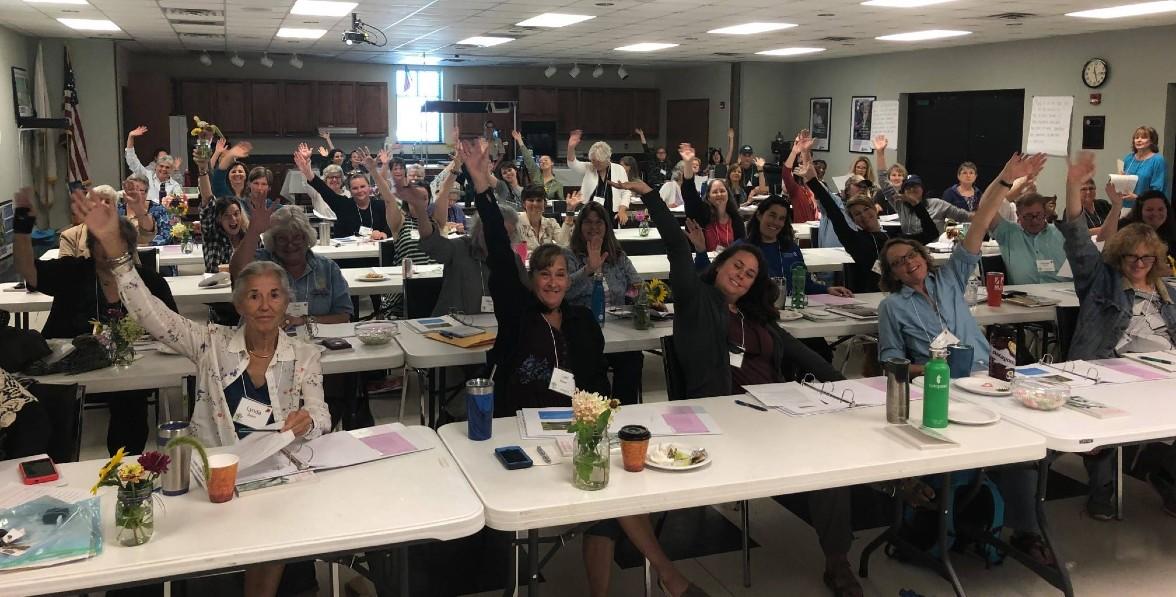More women own forestland and are making important decisions about its future than ever before, but they are less likely to attend conventional landowner programs in our state. Audubon North Carolina and our partners are filling this gap by collaborating on a new program called ForestHer NC. Reserve a spot in an upcoming workshop here.
The workshop series connects and empowers women landowners, teaching them forest management techniques that make forests healthier for birds and communities. Partners include N.C. Wildlife Resource Commission, N.C. Tree Farm, N.C. Forest Service, N.C. State Cooperative Extension, the National Wild Turkey Federation, and the Roanoke Electric Cooperative.
Audubon North Carolina Conservation Biologist Aimee Tomcho is helping lead the charge. She has organized and presented at ForestHer NC workshops from Kinston to Morganton. Here, Aimee answers some pressing questions about this new program.
What is ForestHer NC? An outreach initiative that teaches and empowers women landowners to make important decisions about forest management. But it’s also a fun time. Our workshops bring all kinds of women landowners and natural resource professionals together in the same room so we can share our experiences and knowledge.

Why is Audubon involved? North Carolina’s vast forests provide critical habitat for birds. Audubon North Carolina is the voice for birds when it comes to protecting and managing these woodlands. By reaching out to women landowners, we are ensuring a critical segment of North Carolina forestland owners are equipped to make this land healthier for birds and people.
Who can participate in ForestHer NC? Workshops are open to everyone, but are geared specifically toward women. We typically have a small group of men at each workshop, and we encourage families to attend together so they can help prepare the next generation of landowners.
We have all kinds of experts speak, male and female, but part of our goal is to highlight women professionals in the natural resources and habitat management fields.
What actually happens at these workshops? We learn a lot, and we have fun! At a recent workshop in Morganton, a fiddle player entertained us after a long day of training. We also roll up our sleeves and get into the details of forest and habitat management.
Participants learn how to identify different flora and fauna, including birds. They also pick up new forest management techniques, such as learning how to create snags and forest canopy gaps that are good for birds and help promote the health of forests. We also connect landowners with financial resources that can help fund this kind of work.
How does learning about birds help landowners? When you walk through a forest, stop and listen to the bird song. The species you hear, or maybe don’t hear, tell us important messages about the state of the forest. A healthy forest will have a diverse mix of species.
Birds provide a way to assess forest health without any technical knowledge. Each bird has a different niche—food, water, shelter, space. If you hear a species of bird, then you know the elements of habitat that the bird requires are in your forest. If you know that a certain species that should naturally be occurring there is absent, you can then identify the parts of the forest you would like to manage to recruit that bird. But you also learn important things that impact other parts of your land.
As an example, take Kentucky Warblers. This species (sometimes called the Elvis bird because its facial markings look like sideburns) needs vegetation in the understory of a forest for shelter and nesting. If you don’t have this kind of vegetation in your forest, you won’t have Kentucky Warblers. But you’ll also be vulnerable to flooding.
The above- and below-ground structures of shrubs and lower vegetation helps reduce the impacts of flooding by holding soils in place and diverting rain through leaf cover. So the presence or absence of Kentucky Warblers tells you something important about your forest. The bottom line is birds are a tool to communicate forest health and resiliency.
How can I get involved? ForestHer NC workshops take place across the state. Visit the ForestHer NC event website for details on the next workshop near you.




